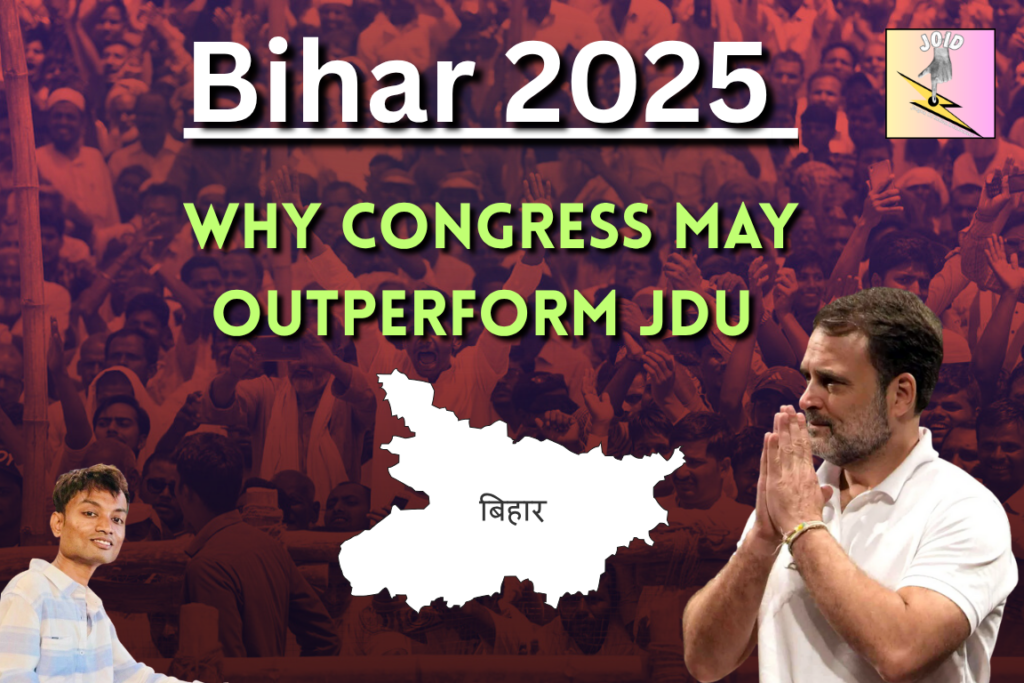
As Bihar approaches the 2025 Vidhan Sabha elections, an unexpected political realignment is quietly taking shape one that could see the Indian National Congress outperforming Nitish Kumar’s Janata Dal (United) in terms of seat count and vote share. At first glance, this might seem implausible, given the Congress party’s recent electoral struggles. But beneath the surface, shifting voter bases, data trends, and internal fractures reveal that JDU may be on the brink of becoming electorally irrelevant, while Congress, though not dominant, is positioned to reclaim lost ground and even surpass JDU in performance.
The numbers from the 2024 Lok Sabha elections offer a telling preview. JDU, despite being in alliance with BJP, contested 16 seats and won 12 but only with full reliance on BJP’s vote transfer. Its standalone performance remained weak, with a vote share of just 18.52%, down significantly from its past electoral highs. In contrast, Congress contested only 9 seats, won none, yet managed to maintain a stable 9.34% vote share, outperforming expectations in several regions. What’s even more revealing is that Congress was the runner-up in at least 11 constituencies, finishing ahead of JDU in nearly seven. This reflects not a wave, but a solid residual vote bank particularly among Muslims, Dalits, and upper-caste secular voters still loyal to the Congress brand in key districts like Kishanganj, Purnia, Darbhanga, Bhagalpur, and Gaya.
Meanwhile, JDU is battling an existential crisis. Nitish Kumar’s repeated political somersaults from NDA to Mahagathbandhan and back have eroded his trust among core support bases like the Kurmi community and Extremely Backward Castes (EBCs). His ideological flip-flops have not only confused the electorate but have also created space for new narratives of regional empowerment and identity, which parties like Congress and RJD are now capitalizing on. The BJP, JDU’s current ally, has made it increasingly clear that it intends to project its own Chief Ministerial face in 2025, signaling that Nitish Kumar is no longer the center of the NDA’s Bihar strategy. This reduces JDU to a junior partner with no independent narrative or mobilizing capacity left.
In contrast, Congress has been steadily working on the ground in Bihar silently but strategically. It has built up its base in Seemanchal, Mithilanchal, and Champaran through local alliances, student wings, and minority outreach. Congress has also benefited from the caste census narrative, as it took a clear and public position in favor of social justice, OBC rights, and minority representation issues that JDU, ironically once the torchbearer of, has now grown silent on. In a post-census political moment where caste consciousness is intensifying, Congress’s ideological clarity may resonate more than JDU’s current ambiguity.
The leadership dynamics between the two parties also tilt in Congress’s favor. Nitish Kumar remains the sole recognizable face of JDU, but his charisma has sharply declined. There is no second line of leadership within the party, and even among loyalists, morale is low. On the other hand, Congress is investing in a new generation of regional leaders figures like Shakeel Ahmad, Ajit Sharma, and Tariq Anwar who are slowly emerging as credible, localized voices. These leaders may not yet be mass mobilizers, but in a fragmented electoral field, their targeted constituency-level impact could translate into seats, especially if RJD’s alliance with Congress holds strong and strategic seat-sharing is executed properly.
It’s also worth noting that the JDU is facing erosion not just ideologically or electorally, but institutionally. Its organizational machinery, once formidable, is now hollow. Booth-level networks have collapsed in many districts, with a large chunk of the youth and EBC vote shifting toward either RJD or BJP, depending on the region. Meanwhile, Congress’s youth, NSUI, and minority cells are active in educational institutions, legal forums, and social movements something JDU lacks entirely. In a state where local caste arithmetic decides seats, even a 1–2% swing in favor of Congress over JDU could result in a reversal of fortunes.
In terms of seats, JDU currently holds 43 seats in the Bihar Vidhan Sabha. Given current trends, analysts project a fall to 15–25 seats if it contests alone or with limited alliance flexibility. Congress, with just 19 seats in 2020, could realistically aim for 20–30 seats in a best-case scenario if it retains its traditional bases and gets a favorable seat-sharing arrangement. What matters more is that Congress has the momentum and the narrative, whereas JDU appears tired, leaderless, and ideologically directionless.
In conclusion, this isn’t about Congress staging a dramatic comeback to dominate Bihar politics it’s about the slow but steady decline of JDU creating space for a second-tier party like Congress to rise again in relevance. Congress’s vote bank may not be expanding drastically, but JDU’s is undoubtedly shrinking. In that relative shift, and with Bihar’s fragmented vote structure, Congress outperforming JDU is not just possible it’s probable. The silent surge is already underway.
Our other articles : From Sushasan Babu to Survival Babu | PK’s 2030 Gameplan | Does Bengal Have a PR Problem? | A scenario of “What ifs” in Bihar | German Chancellor Fellowship discussion |Mission 58: How Congress Plans to Flip Bihar | Bengal Bellwether – 2 | Bengal Bellwether – 1 | India United – India’s message is loud & clear on terrorism a diplomatic strike on terror| The Indian Stock Market is bleeding | SUPER NARI – 25 | Caste and the Ballot in Bihar | The suicidal mission of Pakistan’s so called ‘Establishment’ | Who is Responsible for Bihar’s Migration Crisis? | Why Congress must go solo in Bihar | Jai Bhim | Old is Gold , Resurrection of ‘Dynasty Politics’ | China Faces 125% Tariff by USA: A Strategic Opportunity for India | When the Accuser Becomes the Accused
Books that enriches – India after Gandhi by Ramchandra Guha | Contesting democratic deficit by Salman Khurshid | The election that surprised India By Rajdeep Sardesai

Mayur Gavture is a Political Strategy Consultant and currently working as the legislative & Political Associate at the Office of Hon. Member of Parliament Shri Namdev Kirsan. He also has interests in Election Campaign , Legislative Policy – Advocacy & Governance Advisor.
